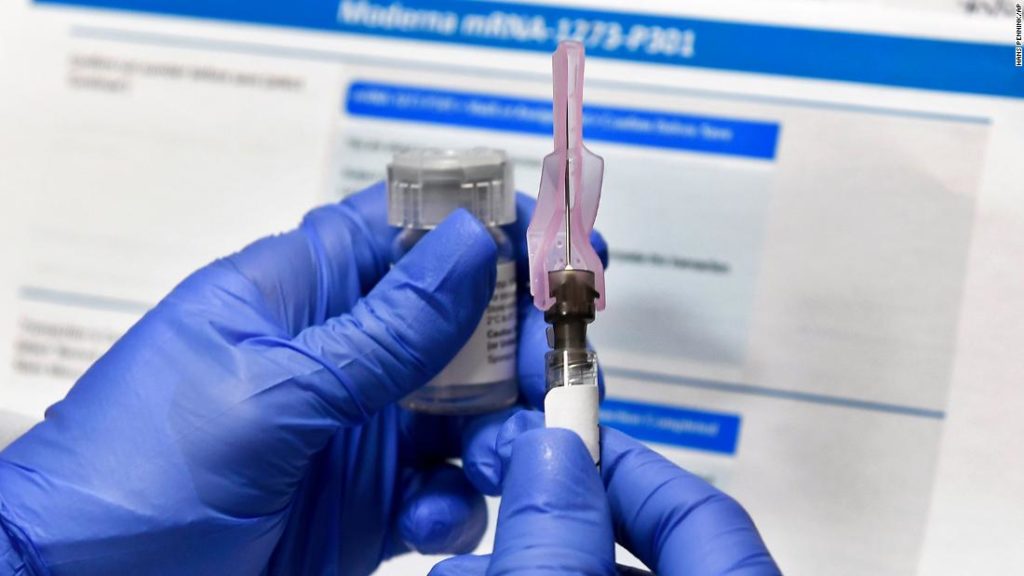The variant has not been identified in the United States, the US Centers for Disease Control and Prevention said in a Tuesday brief, but “given the small fraction of US infections that have been sequenced, the variant could already be in the United States without having been detected.”
Travel between the US and UK, along with the high prevalence of variant in UK infections, increases “the likelihood of importation,” the CDC said.
“We expect that the Moderna vaccine-induced immunity would be protective against the variants recently described in the UK; we will be performing additional tests in the coming weeks,” Moderna said.
Pfizer is “generating data,” it said, on how well blood samples from immunized people “may be able to neutralize the new strain.”
US has not restricted UK travelers
The novel coronavirus has mutated before, and both companies’ vaccines worked against other variations of the virus.
The UK variant “doesn’t change what we need to do” to stay protected, US Surgeon General Jerome Adams said.
“We need to wear masks, wash hands, watch our distances and wait on gatherings, and we need to get vaccines, get vaccinated when those become available,” he said.
More than 614,000 doses of the vaccine have been administered, CDC says. Tens of millions more are expected in coming months.
Dr. Fauci says variant is probably in US
The UK variant probably is already in the US, said Dr. Anthony Fauci, director of the National Institutes of Allergy and Infectious Diseases.
“We’re going to be looking for it right now, and I’m sure sooner or later we’re going to run into it,” he said.
Mutations are common, and most have no noticeable impact, Fauci said. Researchers are trying to determine if the UK variant is more transmissible, but Fauci said it doesn’t seem to be more deadly.
A UK travel ban is “a rather dramatic step,” he said, but he would not be surprised if US officials were considering a testing requirement for travelers from the UK.
Some researchers examining the genome of the UK variant have concerns the mutations might diminish the vaccines’ effectiveness.
“You could imagine some modest hit in vaccine efficacy, which wouldn’t be good, but I don’t think it would break the vaccine,” said Trevor Bedford, associate professor in the Fred Hutchinson Cancer Research Center’s vaccine and infectious disease division.
Other experts are skeptical vaccines will be impacted.
“It doesn’t make people more sick, and it doesn’t seem to have any impact on the protective nature of the vaccine,” Fauci said.
While “there is clear evidence that there is more of it in the population,” there is no real evidence the variant is more transmissible, said Moncef Slaoui, chief scientific adviser for Operation Warp Speed.
The CEO of BioNTech, which collaborated with Pfizer on its vaccine, has “scientific confidence” the companies’ vaccine will work against the variant, but full data won’t be available for two weeks.
“We don’t know at the moment if our vaccine is also able to provide protection against this new variant, but scientifically it is highly likely that the immune response by this vaccine also can deal with the new virus variant,” Ugur Sahin said Tuesday.
The variant has nine mutations but shares all but nine of 1,270 amino acids with the previous version, so the protein remains effectively the same and BioNTech could develop a vaccine against a new variant in six weeks thanks to technology that allows researchers to “engineer vaccine which completely mimics this new mutation,” Sahin said.
Over 600,000 vaccines administered
Since US vaccinations began last week, more than 4.6 million doses have been delivered, and about 614,000 have been administered, the CDC says.
The first round was given to those in assisted living facilities, federal officials and health care workers like Dr. Joseph Varon.
“This is like having gold,” Varon said, holding a box of doses. “I don’t cry, but I came very close. … You know how many lives you can save with this?”
The first doses of Moderna’s vaccine were sent to more than 3,500 sites, compared to about 600 for Pfizer’s. Almost 8 million doses from Moderna and Pfizer will be distributed this week, Operation Warp Speed’s Gen. Gustave Perna said.
CNN’s Jeremy Diamond, Andrea Diaz, Shelby Lin Erdman, Naomi Thomas, Jamie Gumbrecht, Michael Nedelman and Eliott C. McLaughlin contributed to this report.
You may also like
-
UK coronavirus variant has been reported in 86 countries, WHO says
-
NASA technology can help save whale sharks says Australian marine biologist and ECOCEAN founder, Brad Norman
-
California Twentynine Palms: Explosives are missing from the nation’s largest Marine Corps base and an investigation is underway
-
Trump unhappy with his impeachment attorney’s performance, sources say
-
Lunar New Year 2021: Ushering in the Year of the Ox

